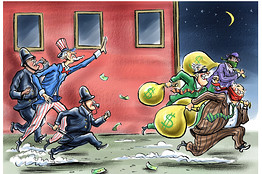Macroeconomists debate feverishly about the causes of a stagnant U.S. economy. Some such as Paul Krugman argue that demand deficiency (a Keynesian diagnosis) requires very aggressive monetary and fiscal policy until the economy reaches its potential. Others, such as Edmund Phelps in an August 6th opinion piece in the New York Times argue that our macroeconomic problems are structural and not related to deficient demand. He argues that
“The [aggregate demand] prescription will fail because the diagnosis is wrong.” He goes on to argue that our focus on reviving demand “lulls us into failing to think structural.” He cites such structural deficiencies as “short term” incentives employed by established businesses and financial managers, poor incentives for innovation, and a lack of inclusiveness in income gains that have arisen over the past two decades. Phelps suggests a number of policy actions that might be taken to put the US economy back on a dynamic path essential for prosperity and growth. In short, we need to move beyond short term demand stimulus to long term incentives to innovate. In his view, “the economy needs a bit of ingenuity.”

 In today’s Wall Street Journal, Gerald O’Driscoll spells out on how theft and fraud have become commonplace. This is not a new story but a growing phenonmenon. The Goldman-Sachs and Lehman cases show how pervasive things are. The cartoon tells it all.
In today’s Wall Street Journal, Gerald O’Driscoll spells out on how theft and fraud have become commonplace. This is not a new story but a growing phenonmenon. The Goldman-Sachs and Lehman cases show how pervasive things are. The cartoon tells it all.


